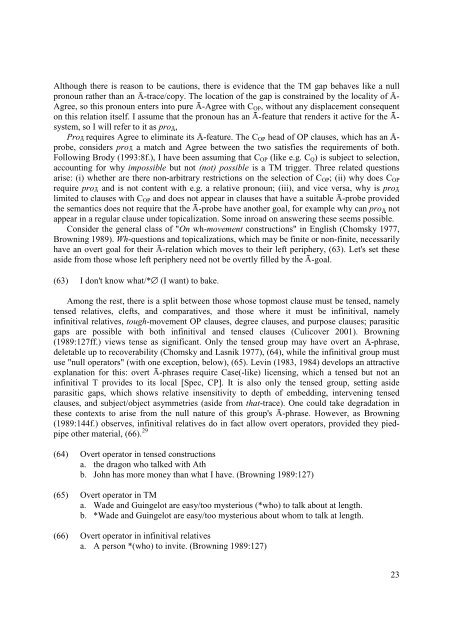1 On tough-movement* Milan Rezac, University ... - Multimania.co.uk
1 On tough-movement* Milan Rezac, University ... - Multimania.co.uk
1 On tough-movement* Milan Rezac, University ... - Multimania.co.uk
You also want an ePaper? Increase the reach of your titles
YUMPU automatically turns print PDFs into web optimized ePapers that Google loves.
Although there is reason to be cautions, there is evidence that the TM gap behaves like a null<br />
pronoun rather than an Ā-trace/<strong>co</strong>py. The location of the gap is <strong>co</strong>nstrained by the locality of Ā-<br />
Agree, so this pronoun enters into pure Ā-Agree with C OP , without any displacement <strong>co</strong>nsequent<br />
on this relation itself. I assume that the pronoun has an Ā-feature that renders it active for the Ā-<br />
system, so I will refer to it as pro Ā ,<br />
Pro Ā requires Agree to eliminate its Ā-feature. The C OP head of OP clauses, which has an Ā-<br />
probe, <strong>co</strong>nsiders pro Ā a match and Agree between the two satisfies the requirements of both.<br />
Following Brody (1993:8f.), I have been assuming that C OP (like e.g. C Q ) is subject to selection,<br />
ac<strong>co</strong>unting for why impossible but not (not) possible is a TM trigger. Three related questions<br />
arise: (i) whether are there non-arbitrary restrictions on the selection of C OP ; (ii) why does C OP<br />
require pro Ā and is not <strong>co</strong>ntent with e.g. a relative pronoun; (iii), and vice versa, why is pro Ā<br />
limited to clauses with C OP and does not appear in clauses that have a suitable Ā-probe provided<br />
the semantics does not require that the Ā-probe have another goal, for example why can pro Ā not<br />
appear in a regular clause under topicalization. Some inroad on answering these seems possible.<br />
Consider the general class of "<strong>On</strong> wh-movement <strong>co</strong>nstructions" in English (Chomsky 1977,<br />
Browning 1989). Wh-questions and topicalizations, which may be finite or non-finite, necessarily<br />
have an overt goal for their Ā-relation which moves to their left periphery, (63). Let's set these<br />
aside from those whose left periphery need not be overtly filled by the Ā-goal.<br />
(63) I don't know what/*∅ (I want) to bake.<br />
Among the rest, there is a split between those whose topmost clause must be tensed, namely<br />
tensed relatives, clefts, and <strong>co</strong>mparatives, and those where it must be infinitival, namely<br />
infinitival relatives, <strong>tough</strong>-movement OP clauses, degree clauses, and purpose clauses; parasitic<br />
gaps are possible with both infinitival and tensed clauses (Culi<strong>co</strong>ver 2001). Browning<br />
(1989:127ff.) views tense as significant. <strong>On</strong>ly the tensed group may have overt an Ā-phrase,<br />
deletable up to re<strong>co</strong>verability (Chomsky and Lasnik 1977), (64), while the infinitival group must<br />
use "null operators" (with one exception, below), (65). Levin (1983, 1984) develops an attractive<br />
explanation for this: overt Ā-phrases require Case(-like) licensing, which a tensed but not an<br />
infinitival T provides to its local [Spec, CP]. It is also only the tensed group, setting aside<br />
parasitic gaps, which shows relative insensitivity to depth of embedding, intervening tensed<br />
clauses, and subject/object asymmetries (aside from that-trace). <strong>On</strong>e <strong>co</strong>uld take degradation in<br />
these <strong>co</strong>ntexts to arise from the null nature of this group's Ā-phrase. However, as Browning<br />
(1989:144f.) observes, infinitival relatives do in fact allow overt operators, provided they piedpipe<br />
other material, (66). 29<br />
(64) Overt operator in tensed <strong>co</strong>nstructions<br />
a. the dragon who talked with Ath<br />
b. John has more money than what I have. (Browning 1989:127)<br />
(65) Overt operator in TM<br />
a. Wade and Guingelot are easy/too mysterious (*who) to talk about at length.<br />
b. *Wade and Guingelot are easy/too mysterious about whom to talk at length.<br />
(66) Overt operator in infinitival relatives<br />
a. A person *(who) to invite. (Browning 1989:127)<br />
23
















